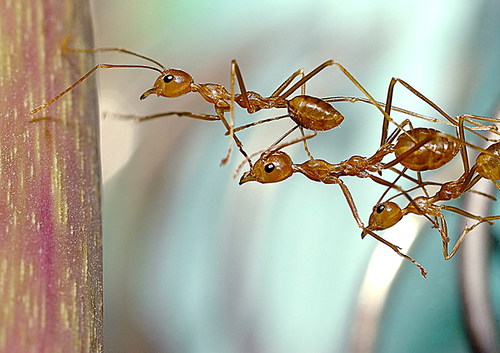 On Friday, Dr. Bill and Kristi took us, Humphrey fellows, to Northern Arizona, (flagstaff and Sedona). We woke up early to start travelling at 6, which was not ideal. But, the beautiful weather and lovely scenery along the way made up for any sleep that I missed. We had team building exercises that I liked. This is not the first time I took part in a teambuilding activities, but it surely was among those few I enjoyed.
On Friday, Dr. Bill and Kristi took us, Humphrey fellows, to Northern Arizona, (flagstaff and Sedona). We woke up early to start travelling at 6, which was not ideal. But, the beautiful weather and lovely scenery along the way made up for any sleep that I missed. We had team building exercises that I liked. This is not the first time I took part in a teambuilding activities, but it surely was among those few I enjoyed.
The exercises seem very simple, but powerful enough to exhibit our group dynamics and made me feel good about our team. We are people from nine different countries and most of us met for the first time a few weeks back. But on Friday, we were working together to form a star blind folded, guiding one another through darkness, carrying each other to pass through “a spider web”. Yes these are fun activities, but they can be cumbersome if you are not with the right mix of people.
I think we did excellent in the crafting our visions and missions; I wish I felt the same way about some other teamworks that I participated in the past. It is true that the nature of the work that a team is tasked can determine the success of a team as it can be straightforward or complicated. However the major contributors toward successful a teamwork are leadership, communication, listening, trust, and clear objective. I also want to add interest and willingness to participate to the list. Because these are the elements that made huge difference for me on Friday. I would say I was fully checked in, unlike in some of my teamwork experiences in the past.
What do literatures say about teamwork? Grace Borrelli, Jennifer Cable, and Malcolm Higgs ask what makes teams work better in their article: Team Performance Management, they say the following 9 points are essential factors for successful teamwork.
- Team balance: the relationship between members should be equal partnership based and they need to have respect for each other;
- Leadership: which strengthens commitment and morale, gives clear direction;
- Team to team: clear interaction among team members;
- Overcoming hurdles: avoiding dependence on external bodies and/or individual dominance;
- Autonomy: freedom to change direction or propose new idea that help achieve the team’s objective ;
- Shared understanding of goals:
- Recognition and giving value to individual contributions;
- Reward achievement;
- Full circle feedback: feedback from all directions.
The authors conclude that one is not powerful enough to create strong effect on its own; they bring best impact when they are combined; this means they also work best in a team. I wanted to share a quote that summarizes the whole text. But I came across with the one that motivates all of us to be best at teamwork.
‘Teamwork is essential – it allows you to blame someone else.’ Author Unknown
Reference
Grace Borrelli, Jennifer Cable, Malcolm Higgs, (1995),”What makes teams work better”, Team Performance Management, Vol. 1 Iss: 3 pp. 28 – 34
Photograph http://www.cesarpereira.com/2011/05/15/qualities-of-a-great-development-team/

I think each of these nine points are necessary for effective, productive and forward-thinking teamwork. I especially think it’s interesting that a form of autonomy is included among the list (number five). Sometimes it might be too easy to get stubbornly set in one-direction thinking in a team, and this flexibility and autonomy to change ways is necessary to keep an open mind for new, potentially better, opportunities to reach the goal.